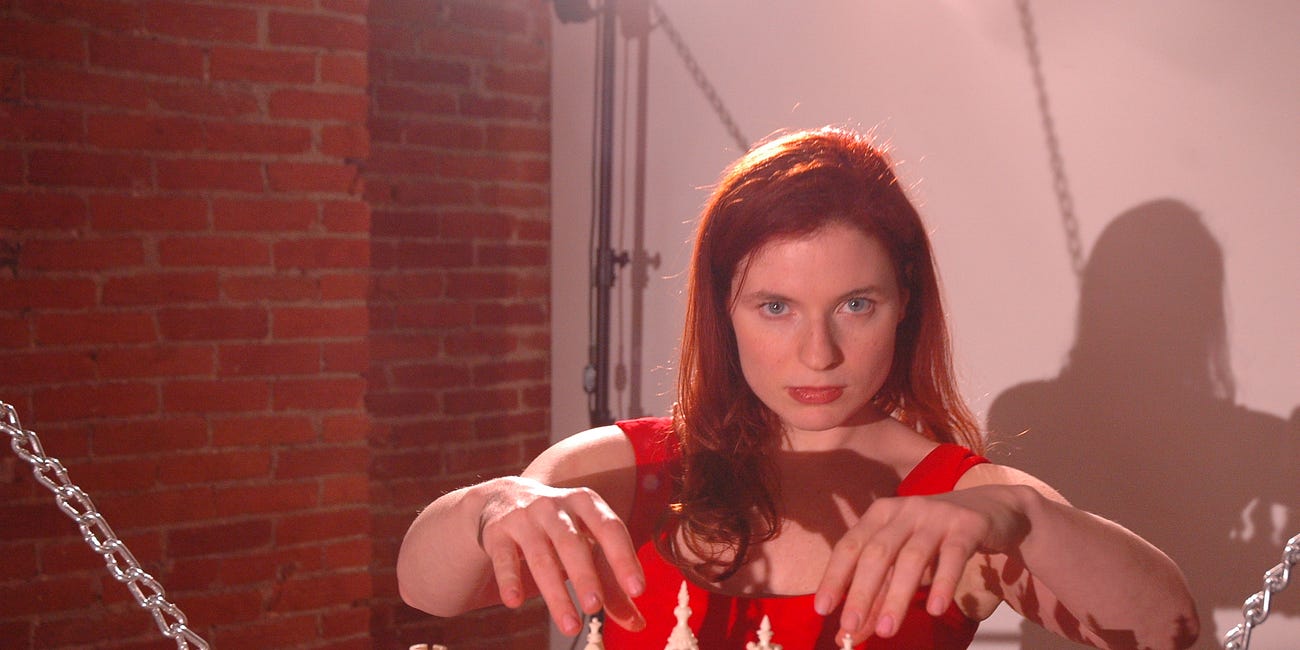When Every Hand is a Miracle
Running good at a poker festival in London, and the feeling of 52!
Earlier this summer, legendary poker champion Andrew “LuckyChewy” Lichtenberger with over 23 million dollars in tournament earnings tweeted something that caught my eye.
Whenever I have seen him coach, play or commentate, his understanding and passion for the math and nature of poker is inspiring.
But I was confused by this post1, which refers to an app that Lichtenberger created (Khemset). In this app, you can train at guessing which card comes next from a shuffled deck. One takeaway was that a poker player might better predict random numbers, and even influence outcomes, by cultivating a stronger “vibratory state.” I wondered if it was a prank. Was there a new April Fool’s like tradition in June that I was unaware of2? Then I checked the comments. While there were some strong contrarian takes, a large number of established poker players were supportive and aligned.
At the time, I was playing Ladies Week at the World Series of Poker, so I started to ask my tables what they thought of all this. It was a great conversation starter, leading to discussions on fate, superstition and rationality. As an added bonus it often revealed things about my opponents’ styles and tendencies.
Many players I spoke to, on and off the tables, thought it was ridiculous to think that anyone could control the cards, or predict what cards were going to come beyond the mathematical odds. I expected those reactions. But the surprise was that this opinion was far less uniform than I expected, even from some successful poker players and brilliant mathematicians.
In fact, a few of the smartest people I know said that they weren’t so sure—maybe there was a little something to this. One even asked me if I’d be willing to bet on it. (In this hypothetical, I’d have to give massive odds3).
I felt as though I’d entered the Poker Twilight Zone. I had thought this was the kind of stuff that only the newest or most naive players would say. “Nines are hot”, or “I could feel the flush coming.” And now we were meant to believe that some of the toughest professionals had always believed there was truth in that? Was this an elaborate hoax to help ignite a new poker boom? Was it a massive bit that I just wasn’t getting?
I sat with all these questions. I thought about it a little bit every day for the next few weeks.
Around the same time, I wrote a section of my next book, THINKING SIDEWAYS4. It was for my chapter on Memory5, where I write about a memory competition called “speed cards” in which mental athletes memorize a deck of cards in order, after looking at the deck for just a number of seconds. The current record holder did it in 12.74 seconds. Without a system and a lot of practice, most of us couldn’t do it even if we had all day.
After all, there’s no hope on relying on similar patterns or past runouts. Each properly shuffled deck of cards is virtually guaranteed to be unique.
If you’ve never heard this statistic before, it may sound unintuitive. Do a little math by hand to understand why there is such a vast number of combinations. There are 52 possible cards that can fit into the first slot, 51 for the next, then 50, all the way down until the last card. You multiply them all together to get the number of possible shuffles.
This number in shorthand is 52 factorial, or 52! It’s a number so large—with 68 digits— that even if every person on Earth shuffled and laid out decks for the rest of our lives, it’s virtually guaranteed that no two shuffles would ever match.
When I first heard about this astronomical number of possible shuffles, it seemed like a super fun fact to drop at parties or in interviews.
But as much as I knew it, I never really felt like every shuffled deck of cards was unique. Like our mortality, it’s one of those things that is quite hard to grasp even once aware of it. And that’s where I connected with the poker mysticism, despite my initial skepticism, even aversion. I can’t rationally wrap my mind around a number as large as 52! What logic can’t fully grasp, imagination can feel.
And it would be a lie to say I never felt a hunch about what may come next, ominous or optimistic. I’ve been wrong just about as often as I’ve been right6, so those feelings always felt like meaningless noise to me. But what if these hunches could transform into something different? Like a way to honor each poker shuffle (and the dealer that is unspooling it), and to pay more attention to each hand. Being more open to this perspective could make me more attentive to nuances like card removal. A reminder to lock in and be grateful for the opportunities that each hand brings7 .
It comes down to paying more attention, and being awed by randomness, rather than using randomness as an excuse to tune out8.
Anytime we are playing poker, we are lucky to be part of the first shuffle ever of its kind. That type of gratitude can’t help but make you pay more attention. In a world where so many of us are starved for deep focus, this is one of the top skills that poker can teach us9.
Beyond the cards, the sheer unlikelihood of any particular poker shuffle appearing is also a reference to how lucky we are to be alive.
We all seriously beat the odds there.
I had this all in mind when I entered day three of the PokerStars Women’s Summer Festival Main Event. The crowning jewel of a week-long tournament series in London, I had already made it into the money, with just 22 players left out of 193.
With a stack just short of average, I still told my son and husband who were also in London not to expect me back till much later. But why would I think I’d be back so late? The blinds were rapidly escalating and logic would dictate that half the field would be out in a couple hours.
You see, I had visualized myself winning. That’s not the kind of tactic I normally engage in. Usually, trying to “manifest” victory feels a little fake to me. So I also visualized myself in two alternative scenarios: losing a flip early on and, bluffing it off in a good spot. In both of these visions, I left the Hippodrome with my head held high. However, I made the losing visualizations quicker and less vivid than the winning visual. It was a way of me honoring rationality, while also energizing myself with a spark of delusional optimism. And so this is why I told my family I’d be a while, rather than a past version of myself, who would say something like: “40% of the time I’ll be back within two hours.”
That day, I went on to win almost every flip, and even some hands that were far from flips, like the one that burst the final table bubble, where I had Queen-Four Offsuit against pocket tens. The other visions I had (losing a flip, bluffing it off) also nearly manifested.
First, the fortuitous flip. I jinxed her when I called King-Queen out as the “Checkmate hand!” Then came the King, for the ubiquitous “sandwich” checkmate10.
And then this bluff. The preflop call is a little ambitious considering this was a final table11, but first place had added meaning for me in this event.
Finally, there was a heavy dose of good Chess Queens12 luck in the hand that won me the tournament. Or Chess Bitch luck, as PokerStars Pro Caitlin Comeskey would call it in the broadcast, referring to the title of my first book.
I was so proud to win the second edition of this event, which was created and organized by my fellow PokerStars ambassador, the Director of Poker at the Hippodrome, Kerryjane Craigie.
As a longtime advocate for rationality and games of skill, I can’t and won’t claim that I “manifested” victory. Not even a little bit.
And yet, it helped to visualize the future that I wanted. Because when it came, I was more ready to embrace it, and each and every miraculous shuffle that led up to it.
See my actual April Fool’s Day post on poker and randomness here:
Have a Heart: Flush Draws and Bias
In poker hand rankings, unlike bridge or spades, no suit outranks another. End of story? Not so fast.
In other words, I’d have to lay odds that this effect wasn’t real—for example, paying $50 to win $1.
UK and audiobook links here: https://www.amazon.co.uk/Thinking-Sideways-Chess-Reveals-Success-ebook/dp/B0CX4X11QS
See my previous piece on Memory here:
5 Things I learned from Memory World Champion Yanjaa Westgate
Before meeting World Memory Champion Yanjaa Westgate, I had so many misconceptions about memory. I thought it was all about brute force, and that it was one of the least fun or creative parts of the learning process.
Though I never really kept score.
In games with lots of cards, like Gin Rummy, these removal effects could add up significantly, since there are more cards to glean such tiny bits of information from. As evidenced by popular tutorials at the Women’s Summer Festival, another such game, Open Face Chinese is having a comeback! If this trend continues, I may have to rewatch my own Run It Once videos.
Random often has a negative connotation. But it can also be a positive. See Sam Greenwood’s recent Punt of the Day for a take on randomizing, from a high-roller’s perspective.
Maria Konnikova’s best-seller the Biggest Bluff, makes this point so convincingly that the subtitle is “How I Learned to Pay Attention, Master Myself, and Win.”
In other words, the play at this stage is supposed to be very tight, due to everyone at the table earning a higher prize when another player is eliminated aka “payjumps”, aka an “ICM” effect.
You can watch the entire final table broadcast here.












Congratulations on winning the summer festival! By the way, is the position on your jacket some crazy endgame where White can draw by running to f6?
Congrats on your recent win! And thank you for using your experience to explore this topic. I hope to meet you at the table one day and have some fun chatter (without giving away too much info, of course!)